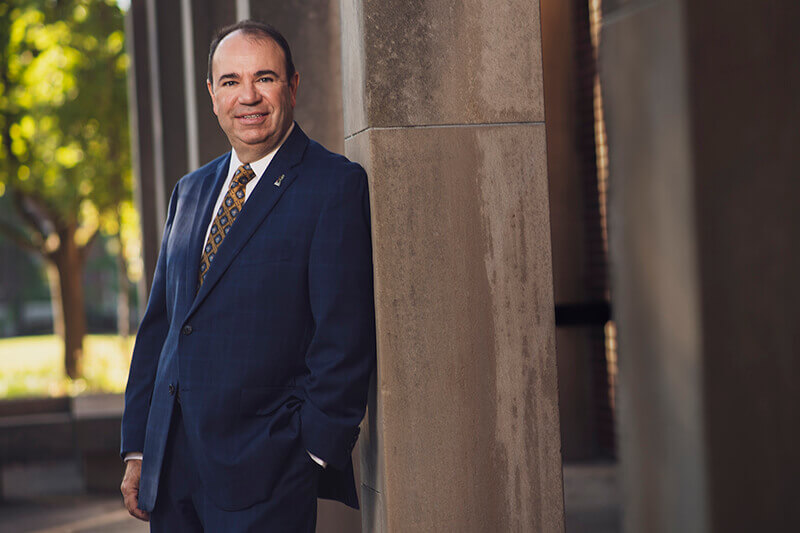October 3, 2010
What will the next 150 years bring for the College of Pharmacy?
 Eric Barker, dean of the College of Pharmacy
Download image
Eric Barker, dean of the College of Pharmacy
Download image
The sesquicentennial celebration marks a time for Purdue to renew its commitment to growth, discovery and innovation. What giant leaps will the next 150 years bring as Purdue continues its drive to meet the world's future challenges? In this monthly Purdue Today series, Purdue's deans have shared their thoughts on the future of their college over the next 150 years. The series concludes with Eric Barker, dean of the College of Pharmacy.
In 1884, just 15 years after the founding of Purdue University, the College of Pharmacy was established on our campus. One hundred and thirty-five years later, we maintain our commitment to the health of the people of Indiana and the world through cutting-edge discoveries, learning and engagement. The next 150 years hold tremendous promise for the profession of pharmacy and the role of our graduates in transforming health care and delivering accessible and affordable patient care.
The role of the pharmacist is rapidly changing due to advances in science and technology. The pharmacist will become central in the delivery of patient care in a broad range of practice settings. We have seen a glimpse of this future in the trends of the past 20 years or so. In 2019, nearly one-third of U.S. adults who get a flu shot receive the vaccination from a pharmacist. This important service is but one illustration of the growing role for pharmacists in health care delivery and demonstrates the pharmacist’s role in addressing important public health concerns associated with preventable and treatable diseases.
Automation, robotics and artificial intelligence will relieve the pharmacist from the tasks associated with medication distribution and allow even more professional activities associated with direct patient care. The Purdue College of Pharmacy is leading the way in this regard. Through an innovative partnership with Starship Technologies, we are exploring the feasibility of robotic drone delivery of medications to patients on the Purdue campus.
Community pharmacies will expand point of care testing for diagnosis and monitoring of a variety of diseases, making the pharmacy a hub for primary health care. The widespread use of wearable and even implanted devices will play a growing role in the treatment of diabetes, cardiovascular disease, infectious disease and cancers.
Discoveries in genomics and data science will enable pharmacists to play a key role in realizing the promise of personalized medicine. In such a role, the pharmacist will work with patients as individuals, ensuring that the patient receives precisely the correct medication and therapies. In addition, the pharmacist will have an essential role in the preparation and delivery of complex treatments such as cell-based or gene-based therapies.
As we have done for 135 years, the Purdue College of Pharmacy will remain steadfast in our commitment to public health and an affordable and accessible pharmacy education – a commitment central to our mission and identity as a land-grant university. Our faculty and staff will prepare our pharmacists and pharmaceutical scientists to adapt to the changes ahead, serving as leaders in health care and pharmacy for generations to come.

